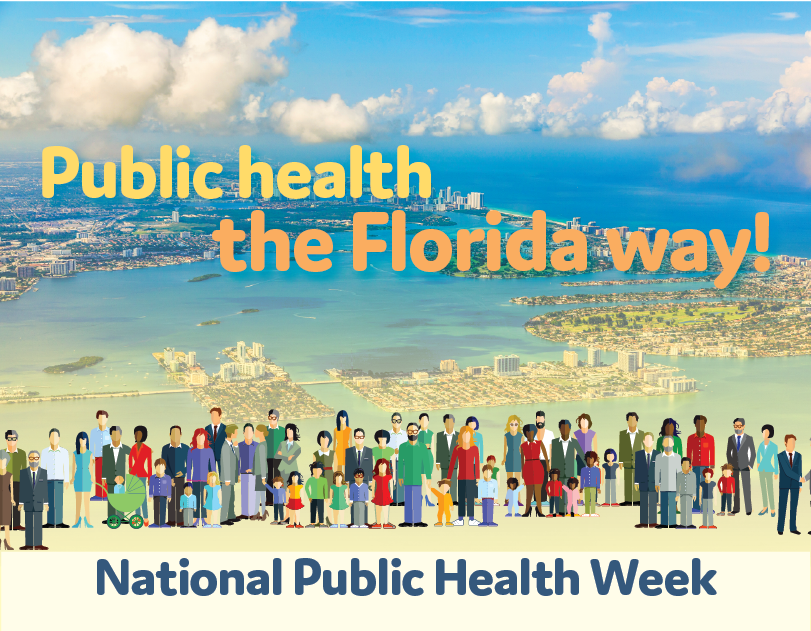It's a New Day in Public Health.
The Florida Department of Health works to protect, promote, and improve the health of all people in Florida through integrated state, county, and community efforts.
Florida Department of Health Celebrates National Public Health Week - The Florida Way
April 03, 2017


April 3, 2017
Florida Department of Health Celebrates National Public Health Week - The Florida Way
Contact:
Communications Office
NewsMedia@flhealth.gov
(850) 245-4111
Tallahassee, Fla.—This week is National Public Health Week and the Florida Department of Health is giving Floridians an inside look at some of the careers behind public health and the dedicated professionals who do them. Each day, the department will highlight a different area of public health including epidemiology, emergency preparedness and response, environmental health and public health nursing. These fields and many more help the department carry out our mission to promote, protect and improve the health of Florida residents and visitors.
“Public health professionals across the state make it their life’s work to keep people and communities healthy; from preventing or containing disease outbreaks like Zika to increasing vaccination rates to maintaining water or air quality,” said State Surgeon General and Secretary of Health Dr. Celeste Philip. “During National Public Health Week, I want to express my deep appreciation for the lifesaving work being done in our state to protect public health and I encourage all Floridians to join me today and #ThankaPublicHealthPro.”
Last year, the department was the first state in the nation to receive national accreditation as an integrated department of health through the Public Health Accreditation Board (PHAB). Accreditation by PHAB signifies that the department, including the state health office and all 67 county health departments, is meeting national standards for ensuring essential public health services are provided in the community.
To kick off this National Public Health Week series, Dr. Philip would like to share how preventive medicine and public health residency training prepared her for her career at the department and what she finds most rewarding about being a public health professional.
Dr. Philip is board-certified in both family medicine and public health and general preventive medicine. Her preventive medicine training was completed through the Centers for Disease Control and Prevention’s (CDC) residency program which enabled her to further develop skills in population health. This included training in biostatistics and epidemiology; community health assessment and planning; environmental health and built environment; health services management and administration; social and behavioral health factors, and health policy. Preventive medicine residency includes a requirement to have or obtain a Master of Public Health (MPH); Dr. Philip had previously received an MPH in maternal and child health while in medical school.
During the CDC residency training, Dr. Philip was assigned to the Florida Department of Health--Polk County where she successfully obtained a local grant to begin a dental sealant program, oversaw the community health assessment and planning process, and supervised the breastfeeding peer counselor program. After completing residency, she served in several department roles including medical director in Polk County, interim director for three county health departments, interim bureau chief of Communicable Diseases, and Deputy Secretary of Health and Children’s Medical Services for three years.,
Now, as State Surgeon General, Dr. Philip is able to look back and recognize how her training prepared her for this role and what is especially rewarding about serving at the department. “I am grateful for the invaluable experience I gained in our department which began as a preventive medicine resident and am humbled that I now have the honor to lead this agency,” she says. “Public health and prevention save lives and money; if we invest strategically to create environments where children and families can thrive, people are more productive and fulfilled, and society benefits.” But, she emphasizes, the fact that some communities have more challenges than others to attain health equity—their highest level of health—remains a concern for her and the department.
Achieving health equity is being addressed through each of the department’s new priority areas. For the next two years, the department will focus on several key areas to improve health in our state including increasing childhood vaccination rates, reducing HIV infection rates, reducing infant mortality rates, decreasing inhaled nicotine use, developing a high quality trauma system, and decreasing licensure processing time for health care professionals.
“Public health professionals have a role in ensuring that all residents have an equitable chance to achieve their greatest health and potential,” Dr. Philip says. “I am so proud to work in a profession that strives to improve the lives of every resident and visitor in the state.”
About the Florida Department of Health
The department, nationally accredited by the Public Health Accreditation Board, works to protect, promote, and improve the health of all people in Florida through integrated state, county and community efforts.
Follow us on Twitter at @HealthyFla and on Facebook. For more information about the Florida Department of Health, please visit www.FloridaHealth.gov.



Connect with DOH